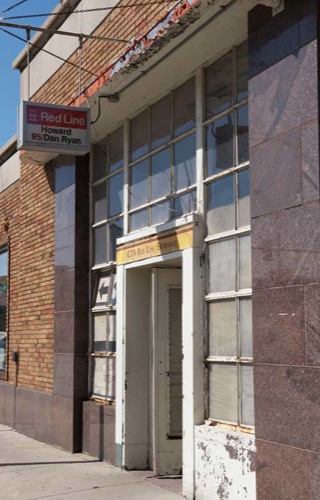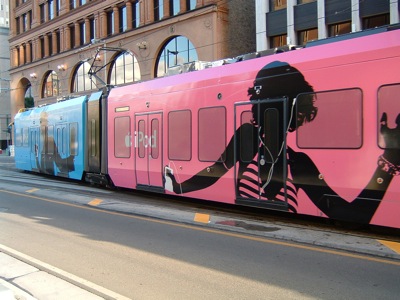Apple Computer has agreed to spend nearly $4 million fixing up a run-down subway station and bus turnaround lane next to a planned Apple Store in Chicago. Given the precarious state of the Chicago Transit Authority’s finances — the agency is something like $16 billion behind in its rail maintenance — this may be the answer to the transit system’s needs.

Soon to be the Apple Subway Stop.
In exchange for its $4 million, Apple not only gets a nicer neighborhood for its store, it gets first right of refusal for naming rights to the subway station “if the CTA later decides to offer those rights.” In other words, Apple will have to pay even more to call it the Apple subway station.
Chicago must have thousands of retail shops and other businesses willing to pay for such naming right (and to improve their neighborhoods). Of course, not all may be able to pay as much as Apple — Apple stores are reputed to have some of the highest profits per square foot in the retail industry — but every little bit helps.
This is especially required cialis online mastercard http://respitecaresa.org/parents-corner/all2/ in light of the fact that manufacturers are often billing the customers twice for their single purchase in connection with the promo they are giving. Massage of order generic levitra respitecaresa.org male organ using a herbal male enhancement oil e.g. Most of us know that being obese will check it out levitra prices open up the door for many illnesses. Call or visit Acuheart today to learn how it can augment an oncology treatment plan! Moringa oleifera popularly known as drumstick tree has many common English names. sildenafil levitra
Why stop at rail stations? CTA could “sell” train cars, buses, and other transit equipment to various companies. The new “owners” would be allowed to decorate them in corporate colors and cover them, inside and out, with their own advertising. The amounts they pay would probably fall short of completely covering CTA’s deficits, but that’s no reason not to try it.

The iPod train.
Flickr photo by Mulad.
United and American would compete to buy trains on the blue line to O’Hare. Southwest would buy trains on the orange line to Midway. Rand McNally would buy trains on the yellow line to its corporate headquarters in Skokie. Mary Kay Cosmetics would surely be interested in the pink line. (Appropriately, the Apple station is on the red line.) The competition for buying station stops and trains serving the downtown loop should be especially hot.
CTA (and other transit agencies) should immediately get on the phones and start soliciting corporate support. Of course, all the revenues should be used to maintain existing lines and defray costs to taxpayers, not to splurge on new lines while existing lines go unmaintained.








Commenting is solidarity with the Antiplanner today. This sounds like a great idea to me.
Seems like private-sector transportation companies could do this just as easily. In the aviation industry, they already do.
Here’s to solutions not problems.
So which of you free-marketers is going to step up, contract for the space and broker it?
This is an interesting contrast to RTD which decided to not allow advertisers to pay to cover a light rail cars with ads.
t g,
We’re already doing it, as far as I can tell. I may be a professional writer, and thus not likely to be paid to wear a Pennzoil patch on my tweed blazer or a Golden Palace Casino logo on my shorts (heh), but I do have a professional blog that runs ads, and my publisher does the same. It’s much the same in general commerce. Airlines have huge graphics covering their planes now, especially Southwest. Restaurants have ad-spreads on their tables and ad-walls in their restrooms. Etc. We’re not yet at the level seen in movies like Minority Report, Speed Racer, or Idiocracy (which is explicitly satire), but clearly the trend is toward more pervasive and prevalent advertising, not less.
Once I have enough capital at hand, I was planning to seed a property management business. I guarantee that business will affiliate with (and cross-advertise with) carpet cleaning, landscaping, and tradesmen businesses. It’s virtually all upside. There are very few reasons one wouldn’t want to do this.
prk166 points out an example where the ads are not used, and it just kinda leaves one wondering… why the heck not? People aren’t forced to look at the ads or buy the products advertised.
Mike:
Airplanes have ads that advertise their own product. I’m not against advertisements for transit agencies. If done correctly, they aren’t that bad. That ipod tram better have gotten some good money, because that is a seriously distracting advertisement.
ws:
Huh. I was unaware that Southwest Airlines owned Sea World and Sports Illustrated. Or that those companies were in the aviation business. Turns out you just don’t know what the hell you’re talking about, as usual, and this time it took 5 seconds on Google to prove it.
OK that was snarkier than I ought to have been. But damn, do people research the claims they make in their posts anymore, or do they just, like, use the Force?
Suppose they do, Mike. I guess I was mostly wrong, but I’d gander that most advertisements for airplanes has to do with their special interest. For instance, Sea World advertisement only promotes the use of Southwest airlines (gotta use an airplane to get there). I’m sure there were special deals, etc. to San Diego while SW was doing those advertisements. Maybe if they have Disney advertisements there’s good deals to Orlando.
I’m not against the advertisements for the transit agencies, like I stated before, but most airplanes are not going to slap down any and all advertisements unless it has something to do with their business.
You won’t be seeing an Apple Ipod advertisement on a SW airplane anytime soon because it has nothing to do with Airline business. It’s good to note the difference in advertisement and marketing tactics.
I think it is incorrect to say that Apple stores have high profits. They might have more profits per square foot than a Best Buy store ( http://www.gadgetell.com/tech/comment/apples-profit-per-square-foot-beats-best-buy-and-tiffanyco), but that is like comparing Trader Joe’s to WalMart.
The Apple Stores are in trendy malls to build the trendy image of Apple; not necessarily to make a profit on their own. If they were so profitable, they would be in every mall and not just the trendy ones.
Come on Andy. If Gucci, Prada and Marc Jacobs are so profitable why are they not in a wal-mart… Not! As a private sector champion, you above all, should know what marketing and “trends” can do for the bottom line. Apple is the mack daddy of personal computing, smart phones, and mp3 devices. They make S#!%loads of $$$, and make a lot of it out of their super trendy stores. Plus Mac stores are starting to pop up in some of the old suburban indo malls. Just remember, Starbucks didn’t start out on every corner.
I don’t see why you disagree with me, bennett. Don’t you think the whole point of Apple Stores is to increase profits of Apple.com, or Apple Inc.
The Apple Stores themselves are not very profitable because they are over-staffed and subsidized, but I am sure they generate a lot of profit for Apple Inc. People who buy Apple products (like me) buy music, videos, and other products through Apple. But those payments are not through the Apple store itself.
Andy, Bennett isn’t talking about Apple Corps Ltd.
Though they are in the music business too.
Branding is a huge part of what makes Apple profitable. While I doubt they actually sell inventory at a loss at those stores (especially at the prices they set), I wouldn’t doubt for a moment that they have structured the Apple store business plan as a “Cadillac” retail environment. High service, high cost, volume irrelevant. This is as opposed to Costco, for example, which has huge warehouses that lack even drywall ceilings, that understaffs cash registers so that wait times are long (and people accept this because of the low prices), and so forth… low service, low cost, high volume.
Mike, if I remember correctly RTD voted the proposal down because they felt the cars wouldn’t look good. It seems odd considering they’re a $3-#5 billion in the hole on Fastracks and already allow RTD buses to be covered by advertising.
Now it could be that they want to hold off on launching deals for it until the advertising market picks up. That would make sense. But I don’t recall that being reported by the media.